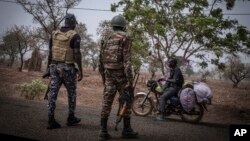The people of the Sahel region continue to suffer, said U.S. Ambassador to the United Nations Linda Thomas-Greenfield at a recent Security Council briefing.
“Terrorism and violent extremism continue to plague communities, a trend that has only exacerbated and accelerated since MINUSMA’s forced withdrawal [the United Nations Multidimensional Integrated Stabilization Mission in Mali],” she said. “Governments are struggling to reclaim control over territory, and are recording record levels of violence. All the while, some governments are engaging in heavy-handed counterterrorism tactics while neglecting the causes of marginalization, worsening the security situation.”
“And the threat is only further spreading,” warned Ambassador Thomas-Greenfield:
“This year, we have seen attacks and continual displacement in Benin and Togo. We have seen deterioration of security in the Lake Chad Basin. And we have seen an uptick in attacks and abductions in northeastern Nigeria.”
The United States is committed to democratic governance, based on respect for human rights and human dignity. And “on this front,” said Ambassador Thomas-Greenfield, “there have been glimmers of hope.”
“We applaud Liberia and Senegal’s democratic transfers of power following elections this year. We welcome positive steps taken by the Gambia to reform its justice system, and develop a hybrid court with ECOWAS [Economic Community of West African States],” she said. “Indeed, it was encouraging to hear from Foreign Minister [Mamadou] Tangara last month on the Gambia’s positive partnership with the Peacebuilding Commission and we commend their decision to defeat the bill on FGM [female genital mutilation].”
At the same time, however, the United States remains concerned by shrinking access to political and civic space in the region, including through the banning of protests and curtailment of freedom of expression.
This is in addition to the increasingly dire humanitarian situation throughout the Sahel and West Africa. Across the region, 32.9 million people are food insecure.
The United States is the largest single humanitarian aid donor to Africa, having provided more than $1.9 billion in assistance across the continent since the beginning of this year.
And yet, it is still not enough to meet the need. “The international community needs to give more,” urged Ambassador Thomas-Greenfield.
In the meantime, the crisis in Sudan continues to unfold, with human rights abuses and famine.
Ambassador Thomas-Greenfield urged the Security Council to step up its commitment to the region. “Terrorism,” she added, “is a global problem that requires a global solution in support of African leadership. We must commit to collective action.”






